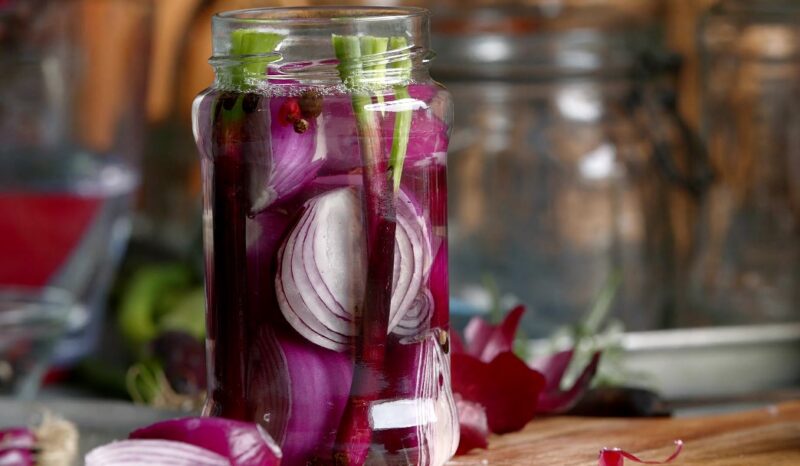Ah, the humble pickled onion – a condiment that can transform an ordinary sandwich into a tangy delight, an accompaniment that adds a zingy crunch to a boring salad, or a garnish that provides a surprising hit of flavor to any dish. There’s no denying that pickled onions are a valuable weapon in a chef’s culinary arsenal. But have you ever wondered about their shelf life? Just how long do pickled onions last?
A Brief Overview
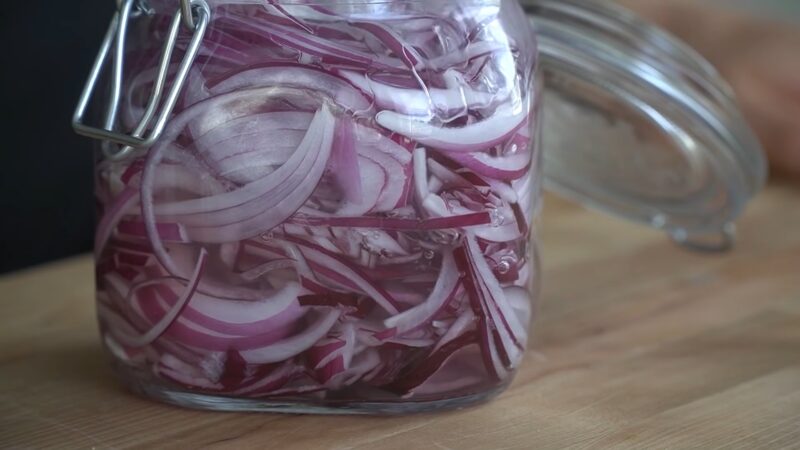
Before we delve into the matter of their longevity, it’s worth taking a moment to understand what pickling is all about.
Pickling is an age-old preservation method, typically involving submersion in a pickling solution made of vinegar, water, sugar, and salt. Vinegar’s high acidity creates an environment where harmful bacteria struggle to survive, which in turn extends the food’s shelf life significantly.
Onions, due to their firm texture and natural robustness, are an excellent candidate for pickling. They absorb the pickling solution well, resulting in a product that has a balanced blend of sweet, sour, and savory tastes.
The Shelf Life of Pickled Onions
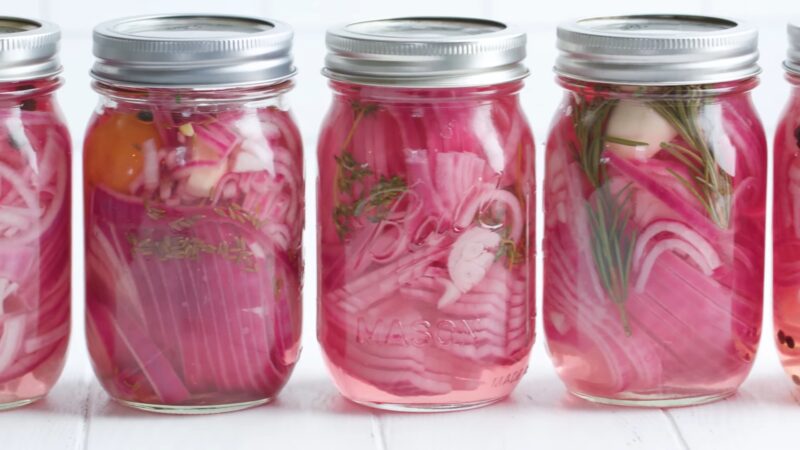
Now, let’s answer the question you’re here for: How long do pickled onions last?
Well, the answer depends on a few variables: the pickling process, storage conditions, and whether the jar has been opened.
Unopened Pickled Onions
If you have a store-bought jar of pickled onions that haven’t been opened, it can last for up to two years in your pantry. The high acidity of the vinegar, combined with the sealed environment of the jar, helps to preserve the onions and prevent any bacterial growth.
Opened Pickled Onions
Once opened, the longevity of pickled onions starts to depend on how they are stored. If you always use a clean utensil to retrieve the onions and return the jar to the refrigerator after use, a jar of pickled onions can last for several months. Typically, it’s good for up to six months, but it may last longer if you’re particularly careful with hygiene and storage conditions. Always make sure to check for signs of spoilage before use.
Homemade Pickled Onions
If you’re into DIY and have made your own jar of pickled onions, the shelf life will be a bit different. When properly canned and sealed, homemade pickled onions can also last for up to two years unopened.
Once opened, you can expect your homemade batch to stay good for around two weeks to a month in the fridge. The exact time can vary depending on your pickling solution and the cleanliness of your process. If you notice any change in smell, color, or texture, it’s safer to discard them.
Extend the Life of Your Pickled Onions
Now that we know how long pickled onions last let’s dive into some tips on how you can ensure they last as long as possible.
1. Proper Storage
One of the key ways to extend the shelf life of your pickled onions, whether store-bought or homemade, is proper storage. Always store your opened jar of pickled onions in the refrigerator. This cold environment can greatly slow down the growth of harmful bacteria.
2. Clean Utensils
It’s very important to always use clean utensils when retrieving onions from the jar. Bacteria from previously used forks or spoons can contaminate the whole jar, leading to quicker spoilage.
3. Keep them Submerged
The onions should be kept submerged in the pickling liquid. This acidic environment helps prevent bacteria from growing on the onions. If you notice that your onions are not fully submerged, it might be a good idea to make some extra pickling solution and add it to the jar.
Signs of Spoilage
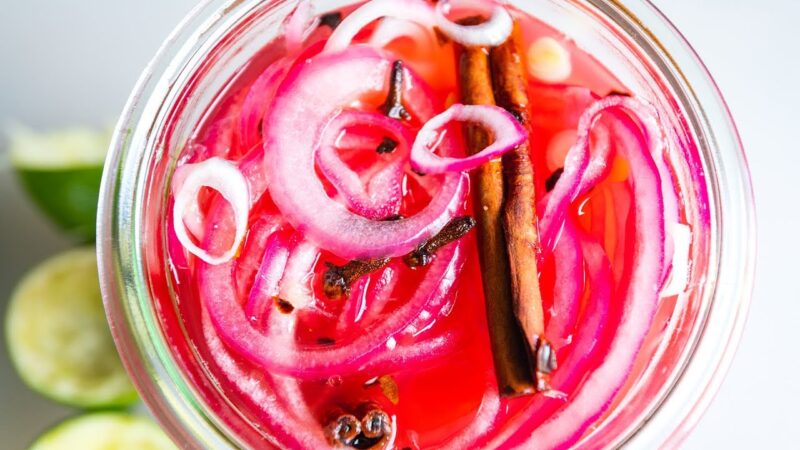
Now that you know how to extend the life of your pickled onions, it’s also essential to understand the signs of spoilage. Just because a jar of onions can last for up to two years doesn’t mean it always will. Here’s what to look out for:
- Change in Color: If the onions have changed color significantly, it might be a sign of spoilage. Pickled onions should maintain their bright, vibrant color.
- Foul Smell: If the jar of pickled onions has a foul or off smell, it’s time to throw it away.
- Mold: Any visible signs of mold in the jar is a clear indication of spoilage. This is a sign that the jar should be discarded immediately.
- Bulging Lid: If the lid of the jar is bulging, it indicates gas production inside the jar, a sign of bacterial activity.
How to Make Pickled Onions
The first step in understanding how the pickling process influences the longevity of your pickled onions is to break down the pickling process itself.
To pickle onions, you will need the following ingredients:
- Onions peeled and thinly sliced
- Vinegar (white vinegar, apple cider vinegar, or red wine vinegar all work)
- Sugar
- Salt
Optional ingredients that can add flavor include mustard seeds, black peppercorns, or even spices like turmeric or cloves.
The process is simple:
- Boil vinegar, water, sugar, and salt in a pot until the sugar is dissolved.
- Place onions in a jar.
- Pour the hot vinegar mixture over the onions.
- Let the mixture cool before sealing the jar and refrigerating.
How the Pickling Process Affects Longevity
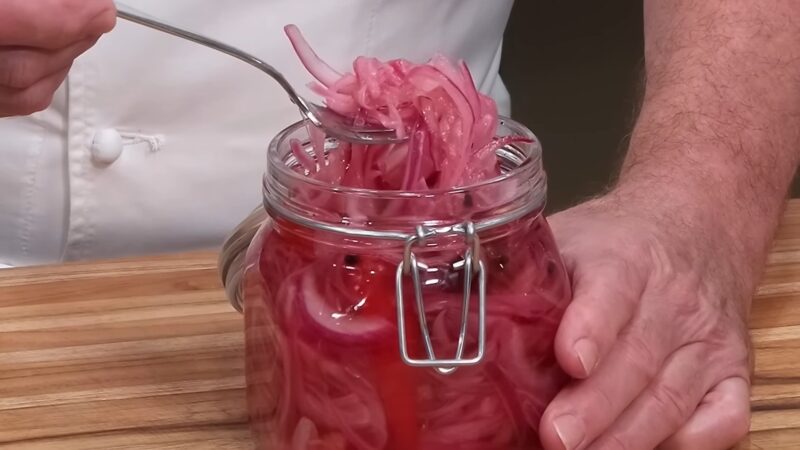
There are several factors in the pickling process that can influence how long your pickled onions last.
Vinegar’s Acidity Level
The acidity of the vinegar plays a crucial role in the longevity of your pickled onions. A higher acidity level means a longer preservation time. White vinegar typically has the highest acidity level, while other kinds of vinegar, like apple cider or balsamic, might have lower acidity.
Type of Onion
The type of onion used can also have a minor impact on the longevity of your pickled onions. Red onions are most commonly used due to their color and flavor, but you can use white or yellow onions as well.
Sugar Content
The sugar in your pickling solution doesn’t just balance out the sourness of the vinegar; it also acts as a preservative. Too little sugar can reduce the shelf life of your pickled onions, while too much can overpower the onions’ natural flavors.
Storage Jar
The type of jar used for storage is another factor that can affect the lifespan of pickled onions. Glass jars are typically the best option, as they do not react with the vinegar solution. It is also crucial to ensure the jars are clean and sterilized before use to prevent any bacteria or mold growth.
Frequently Asked Questions
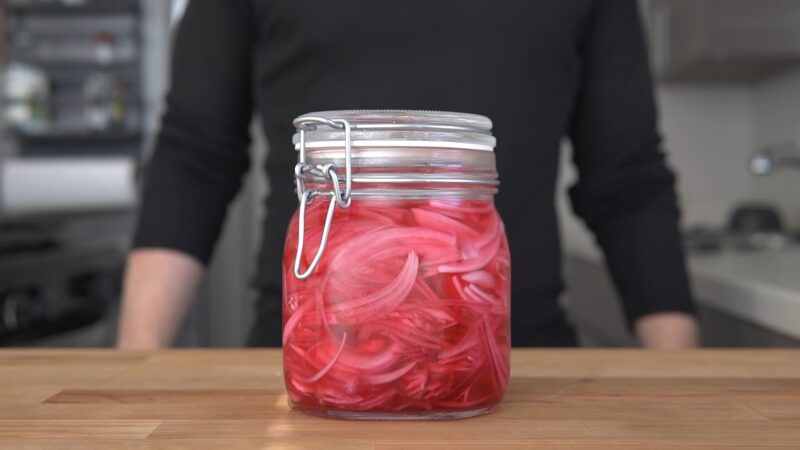
1. Can I Pickle Onions without Vinegar?
While vinegar is traditionally used in pickling due to its high acidity, it is possible to pickle onions without vinegar using a lacto-fermentation method. This involves using a saltwater brine and allowing natural bacteria to ferment and preserve the onions. However, the flavor and shelf life of lacto-fermented onions will be different from traditionally pickled onions.
2. Can I Reuse the Pickling Brine?
Yes, you can reuse the pickling brine, but it may lose some of its potency after each use. If you choose to reuse the brine, make sure to bring it to a boil before reusing it to kill any potential bacteria.
3. Can Pickled Onions Go Bad if Not Refrigerated?
If the jar of pickled onions is unopened, it can stay in a cool, dark place like a pantry for up to two years. Once opened, it needs to be refrigerated to extend its shelf life.
Final Words
In conclusion, pickled onions are a versatile condiment with a reasonably long shelf life. Proper storage, hygiene, and an observant eye for signs of spoilage can help extend their longevity to the maximum. Now that you’re armed with this knowledge go ahead and enjoy your tangy, crunchy pickled onions without any worry!
Remember, even though pickled onions can last for quite a long time, the fresher they are, the better they taste. So don’t let them linger too long in the back of your fridge. Make them a regular part of your meals, and enjoy the burst of flavor they bring to your dishes.

